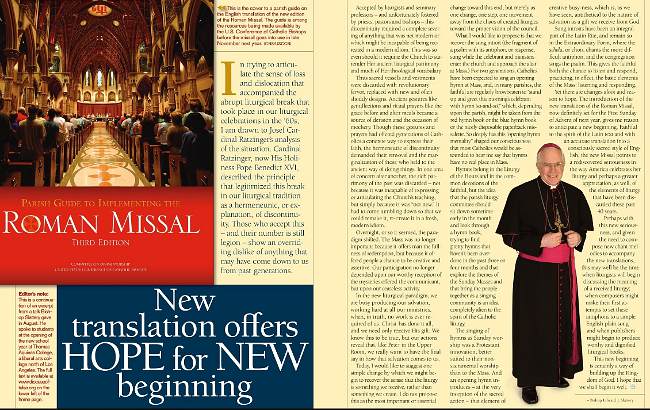I sitt novembernummer fortsetter det katolske bispedømmet i Tulsa, Oklahoma, sin presetasjon av biskop Edward Slatterys foredrag om liturgien. Han skriver om hvor mye som (han mener) ble ødelagt i liturgien på 60-tallet, men også om håpet om forbedring:
Accepted by liturgists and seminary professors – and unfortunately fostered by priests, pastors and bishops – this discontinuity required a complete severing of anything that was not modern or which might be incapable of being recreated in a modern idiom. This was so even should it require the Church to surrender Her ancient liturgical patrimony and much of Her theological vocabulary.
… Ancient gestures like genuflections and ritual prayers like the grace before and after meals became a source of derision and the occasion of mockery. Though these gestures and prayers had offered generations of Catholics a concrete way to express their faith, the hermeneutic of discontinuity demanded their removal and the marginalization of those who held to the ancient way of doing things. In one area of concern after another, the rich patrimony of the past was discarded – not because it was incapable of expressing or articulating the Church’s teaching, but simply because it was “not new.” It had to come tumbling down so that we could remake it, re-create it in a fresh, modern idiom.
Overnight, or so it seemed, the paradigm shifted. The Mass was no longer important because it offers man the fullness of redemption, but because it offered people a chance to be creative and assertive. Our participation no longer depended upon our worthy reception of the mysteries offered the communicant, but upon our ceaseless activity.
In the new liturgical paradigm, we are busy producing our salvation, working hard at all our ministries, when, in truth, no work is ever required of us. Christ has done it all, and we need only receive His gift. … Today, I would like to suggest one simple change by which we might begin to recover the sense that the liturgy is something we receive, rather than something we create. I do not propose this as the most important or essential change toward this end, but merely as one change, one step, one movement away from the chaos of created liturgies toward the proper vision of the council. …
…. Yet there are changes afoot and reason to hope. The introduction of the new translation of the Roman Missal, now definitely set for the First Sunday of Advent of next year, gives me reason to anticipate a new beginning. Faithful to the spirit of the Latin text and with an accurate translation into a consciously sacred style of English, the new Missal points to a rediscovered seriousness in the way America celebrates her liturgy and perhaps a greater appreciation, as well, of the elements of liturgy that have been discarded these past 40 years.
Perhaps with this new seriousness, and given the need to compose new chant melodies to accompany the new translations, this may well be the time when liturgists will begin discussing the meaning of a received liturgy; when composers might make their first attempts to set these antiphons to a simple English plain song and when publishers might begin to produce worthy and dignified liturgical books.
This new beginning is certainly a way of building up the Kingdom of God. I hope that we shall begin it well.

